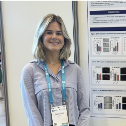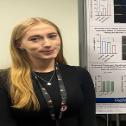Robert Callaghan

I am currently pursuing a Ph.D with a thesis titled "Post-Stroke Depression: A Study of Risk Factors and Mechanisms," under the guidance of Dr. Rachel Moloney, Dr. Irene Hartigan, and Prof. Christian Waeber. This research aims to unravel the prevalence, risk factors, and characteristics of post-stroke depression onset among stroke survivors in Ireland. I also aim to employ an in-vivo model, to explore the intricate role played by various neurochemical mechanisms, including depleted monoamines, and HPA axis dysregulation resulting from stroke onset, contributing to post-stroke depression.
Fionnuala Wilson
 My project aims to investigate the potential of the neurotrophic factor Growth/Differentiation Factor 5 (GDF5) in animal models of Parkinson's disease through a gene therapeutic approach. GDF5 activates the BMP-Smad signalling pathway so my research also focuses on characterising the expression of elements of this pathway in the Pakrinsonian and non-parkinsonian brain to provide a comprehensive picture of its therapeutic potential in PD.
My project aims to investigate the potential of the neurotrophic factor Growth/Differentiation Factor 5 (GDF5) in animal models of Parkinson's disease through a gene therapeutic approach. GDF5 activates the BMP-Smad signalling pathway so my research also focuses on characterising the expression of elements of this pathway in the Pakrinsonian and non-parkinsonian brain to provide a comprehensive picture of its therapeutic potential in PD.
Rachel Roberts

My PhD project is focused on investigating how genetics interact with environmental factors to affect risk of Parkinson’s Disease (PD) development. Specifically, I’m looking at the cellular mechanisms by which genetic mutations in the LRRK2 or GBA1 genes may interact with pesticides, like Glyphosate (Roundup®), to increase an individuals risk of developing PD. To examine this we are using a novel, Irish-patient specific cellular model. By taking skin cells from patients with PD-associated mutations (LRRK2 or GBA1) and healthy controls, we can transform the skin cells into induced pluripotent stem cells (iPSC), which are capable of turning into any cell type in the body and retain the donor cell genetic background. These iPSCs can be reprogrammed into midbrain dopamine (mDA) neurons, the cell population most affected in PD. We can then use these patient-specific, mDA neurons to uncover the cellular mechanisms by which pesticides like rotenone and glyphosate may preferentially induce neurotoxicity in mDA neurons possessing LRRK2 or GBA1 mutations
